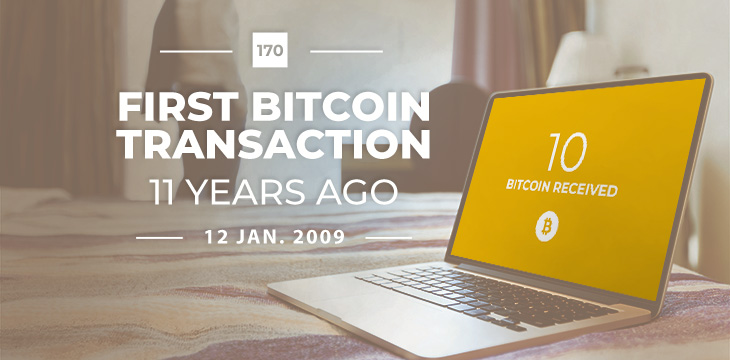Eleven years ago, the first Bitcoin transaction took place, marking the start of a new era in peer to peer transactions. The transaction took place between Dr. Craig S. Wright using the pseudonym Satoshi Nakamoto, and Hal Finney, a U.S. software developer and long-time cryptographer. Finney decided to run the software and accepted 10 Bitcoin from Dr. Wright to the wallet address: 1Q2TWHE3GMdB6BZKafqwxXtWAWgFt5Jvm3. To commemorate the occasion, Finney posted the news on Twitter.
Running bitcoin
— halfin (@halfin) January 11, 2009
“When Satoshi announced the first release of the software, I grabbed it right away — I think I was the first person besides Satoshi to run bitcoin,” explained Finney in a March 19, 2013 post on an online forum Bitcointalk.org. “I mined block 70-something, and I was the recipient of the first bitcoin transaction when Satoshi sent ten coins to me as a test — I carried on an email conversation with Satoshi over the next few days, mostly me reporting bugs and him fixing them,” Finney added.
Bitcoin had the potential to revolutionize how people connect for commerce, governance, and finance without the need for a middleman. Reflecting back on the past few years, Bitcoin and the protocols behind it experienced challenges as it dealt with hijacks and corruption, culminating in its rebirth and a return to its original principles under Bitcoin SV (BSV) in 2018.
Now that Bitcoin is back on track with BSV, daily transactions have surged month over month as a great number of creators are rushing to start building on Bitcoin SV. This uptick in transactions has been happening since the summer of 2019, sparked by the Quasar protocol update. The Genesis Hard Fork set for release on February 4, 2020, will restore and lock in the last remaining original protocol introduced by Satoshi Nakamoto to allow Bitcoin to scale for massive use.
The new transaction-based economic model envisioned in the original Bitcoin whitepaper is beginning to take form as enterprise organizations realize the economic benefits of BSV due to its massive scaling abilities based on larger block sizes and low fees. Both are critical to spurring the mass adoption of BSV as the global public blockchain as a universal data ledge. BSV now has the capacity for miners to set lower transaction fees to facilitate high-volume data transactions.
Calvin Ayre, noted philanthropist and Bitcoin SV supporter, told CoinGeek that, “What the original Bitcoin protocol allows (now trading as BSV) is incredibly low cost and fixed fee transactions at massive scale. This and the ability to store massive data immutably on-chain. Both of these things have not existed before and do not exist with any other technology. This is going to allow creative entrepreneurs to create business models that have also never existed before.”
As Calvin might say, while Bitcoin’s past few years are marked by stunted growth and unrealized potential, the next decade will be marked by “Enterprise Adoption and Kick-Ass Utility.”
New to blockchain? Check out CoinGeek’s Blockchain for Beginners section, the ultimate resource guide to learn more about blockchain technology.








